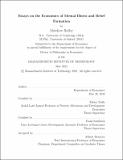| dc.description.abstract | This thesis consists of three chapters. Chapters 1 and 2 study questions relating to the economics of mental illness, while Chapter 3 contributes to the literature on the behavioral economics of belief formation.
The first chapter studies why people who live in poverty are disproportionately affected by mental illness. Gautam Rao, Frank Schilbach, Vikram Patel and I review the interdisciplinary evidence of the bidirectional causal relationship between poverty and common mental illnesses---depression and anxiety---and the underlying mechanisms. Our review shows that mental illness reduces employment and therefore income and that psychological interventions generate economic gains. Similarly, negative economic shocks cause mental illness, and anti-poverty programs, such as cash transfers, improve mental health. A crucial step toward the design of effective policies is to better understand the mechanisms underlying these causal effects.
In the second chapter, I study discrimination against people with common mental illnesses in labor market settings -- one important mechanism through which mental illness may (indirectly) cause lower employment and income. In an online experiment, I find that people pay to avoid depressed or anxious coworkers in a simple communication-based problem-solving task---paying as much to avoid them as they do to work with the college-educated. A model of earnings-maximizing statistical discrimination with correct beliefs cannot explain these preferences: depressed or anxious coworkers are equally productive when exogenously assigned. Instead, I find evidence that discrimination is driven by incorrect beliefs about such coworkers as well as an increase in costly effort when working with them. A major motivation for tackling discrimination is often to encourage revelation of mental illness (thereby perhaps improving access to treatment or support); however, I find that people pay to hide mental illness in my setting even when insulated from rejection or any financial consequence of discrimination.
In the third chapter of my thesis, John Conlon, Malavika Mani, Gautam Rao, Frank Schilbach and I study social learning between spouses using an experiment in Chennai, India. We vary whether individuals discover information themselves or must instead learn what their spouse discovered via a discussion. Women treat their `own' and their husband's information the same. In sharp contrast, men's beliefs respond less than half as much to information that was discovered by their wife. This is not due to a lack of communication: husbands put less weight on their wife's signals even when perfectly informed of them. In a second experiment, when paired with mixed- and same-gender strangers, both men and women heavily discount their teammate's information relative to their own. We conclude that people have a tendency to underweight others' information relative to their own. The marital context creates a countervailing force for women, resulting in a gender difference in learning (only) in the household. | |
